The content of the article
Almonds are considered an elite nut, which has a delicate oriental taste, bright aroma and a lot of useful properties. Nutritionists recommend that the expectant mother eat almonds at least several times a week, which will have a beneficial effect on the pregnancy and development of the baby.
Of course, a nut contains a lot of fats and concentrated substances, as well as essential oils, which can cause allergies or lead to general malaise. Therefore, almonds should be used during pregnancy carefully, strictly controlling portions.
Chemical composition
Almonds are considered one of the most healthy nuts due to their amazing composition:
- beauty vitamins A and E, as well as B and PP;
- riboflavin (100 g of almonds contains more than half the daily value);
- polyunsaturated fatty acids (oleic, linoleic and others);
- Proteins
- ash;
- dietary fiber;
- essential oils;
- organic acids;
- interchangeable and essential amino acids;
- macro- and microelements (magnesium, iron, calcium, zinc, selenium, potassium, phosphorus, manganese and others).
Vitamin B9 (folic acid) is necessary for a pregnant woman in the first trimester, as it prevents the occurrence of birth defects and malformations of the embryo (for example, pathology of the development of the neural tube).
Other B vitamins, together with magnesium and phosphorus, strengthen the nervous system of the expectant mother and child, restore neural connections. They make mood swings less noticeable, reduce anxiety and nervousness, irritability, stress, depression. Also, these vitamins and minerals improve memory, attention and performance, increase mood.
Vitamin E is a natural antioxidant that prevents the oxidation of cells and removes radicals from the body. Due to this, the likelihood of developing benign and malignant neoplasms is reduced.
Beauty vitamins A and E protect the skin from stretch marks, reduce sagging and manifestations of cellulite, tone up and tighten the epidermis.
Plant proteins are a good building material for the muscular system and musculoskeletal system of the child. Calcium in the composition also helps to strengthen the bone and cartilage of the fetus, skeleton and teeth of the pregnant woman.
Fatty acids normalize the secretory function of the genital glands, due to which enough hormones are produced to maintain a normal pregnancy and general hormonal background. They also participate in gas exchange, providing oxygen saturation of the cells of the child and mother. A sufficient level of linoleic and oleic acid prevents the fetal growth retardation, frozen pregnancy and reduces the risk of miscarriage, premature birth.
Essential oils trigger the pregnant woman’s immune system, increasing the body’s resistance to diseases and allergies.
Potassium has a positive effect on the heart muscle, which is forced to pump blood through an additional circle of blood circulation (placental). Also, this microelement strengthens the vascular walls, makes their surface flexible and more resistant to the attachment of atherosclerotic or cholesterol plaques.
What is almonds good for during pregnancy
The kernels of aromatic walnut have the following properties, useful for the pregnant woman and her child.
- They reduce psycho-emotional excitability, so that the expectant mother does not complain of insomnia and frequent awakenings.
- Reduce blood sugar, which is important for pregnant women with gestational diabetes.
- Strengthen the cardiovascular system, normalize blood flow, accelerate the production of blood cells.
- Prevention of uterine hypertonicity is performed.
- Reduce the level of "bad" cholesterol in the blood, which is important for mother-meat-eaters.
- Improve digestion and intestinal motility. They help fight nausea and vomiting in the first trimester, and chronic constipation in the second and third.
- They accelerate cell division, which is important in the diagnosis of "slower fetal growth."
- Reduce pain, eliminate headaches and migraines, stomach cramps and intestinal colic.
- Prevention of iron deficiency anemia, as well as kidney stone and urolithiasis, is performed.
- They produce a light choleretic and laxative effect.
- Strengthen hair follicles and nail plates.
How to choose and eat almonds
The most useful for the expectant mother will be sweet raw almonds, which are sold in shells. Before choosing, evaluate its integrity, inspect for rust, dust, mold, etc. For better preservation, walnut kernels are sold in sealed packaging.
Peeled sweet almonds can be sold both in bags and by weight. Pay attention to the cores - they should be smooth, even and of the same color. Shriveled, too soft and lethargic nuts are not recommended for consumption.
If the almonds are fresh, the aroma will be delicate and very pleasant. Otherwise, the smell of bitterness or missing vegetable oil appears.
If you buy a roasted nut, then ask if the heat treatment has passed with the use of oil. It is necessary that in the process of cooking the nut is fried in its own juice.
The bitter almond variety contains hydrocyanic acid, which is toxic to the mother and child. Such nuts, even in a thermally processed form, are contraindicated for expectant mother.
You should not pay attention to flashy packaging with almonds. Often, imported oriental sweets have preservatives, flavors and flavor enhancers in the composition.
Keep nuts exclusively in a cool, dry place, away from sources of heat and sunlight. The container must be hermetically sealed and free from moisture.
Contraindications and adverse reactions from almonds
The nut contains extractive components and essential oils, which can cause heaviness in the stomach and adversely affect the health of some expectant mothers.
Unfortunately, almonds are a common allergen. If you have a history of food allergies, then consult an allergist before leaning on fragrant kernels.
Expectant mother must be aware that nuts contain fatty acids and lipids, as a result of which they are quite high in calories. It is not recommended to use almonds in the last trimester, as well as in the presence of excess weight.
A categorical contraindication is the presence of cardiovascular pathologies (tachycardia, arrhythmias, a history of heart attack, etc.), as well as violations in the hemostatic system.
If you eat kernels too often and exceed the dosage, the following adverse reactions are possible:
- dizziness and headaches;
- general weakness;
- acute food allergy (up to anaphylactic shock);
- pain in the gallbladder, a sharp discharge of bile, heartburn;
- indigestion, diarrhea;
- increased symptoms of toxicosis;
- psycho-emotional disorders (for example, a condition similar to drug intoxication).
In order for almonds to bring only benefits to the body of a pregnant and unborn child, it is recommended to use no more than ten kernels per day. It is necessary to start introducing the nut into the diet gradually, starting from 1-2 pieces per day.
If the pregnancy proceeds safely, and the future mother has no contraindications, then the almonds will be an excellent snack. This nut will saturate the body with energy, relieve anxious thoughts and strengthen immunity.
Video: what will happen to the body if you eat only 4 almonds

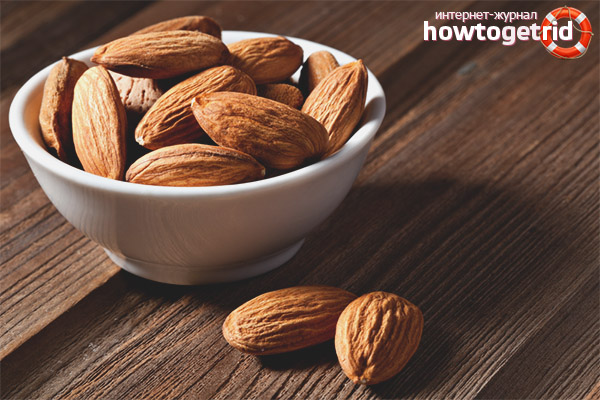
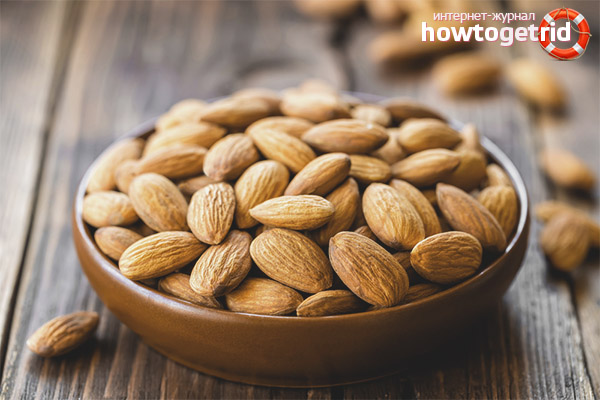
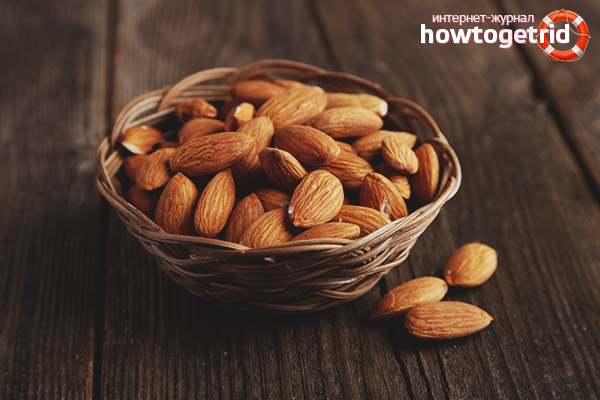


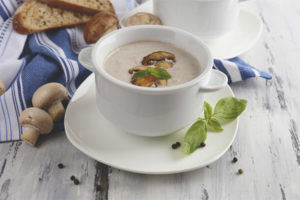
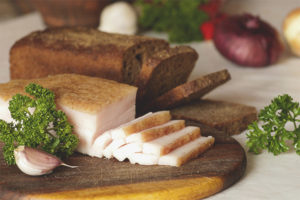



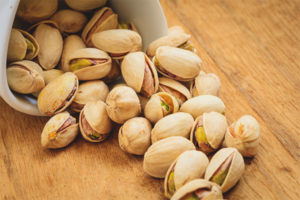
Submit